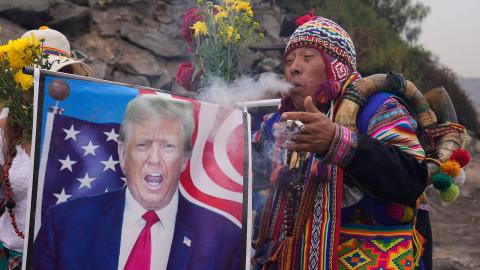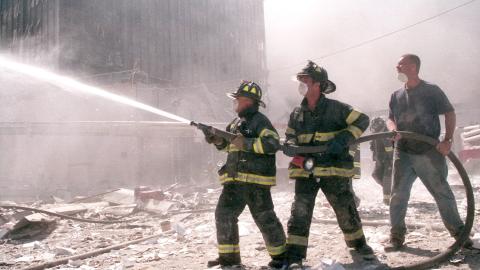Coinciding with the 20th anniversary of the impeachment proceedings of President Bill Clinton, The Clinton Affair speaks with the former White House intern who nearly brought down an American President, Monica Lewinsky. Chronicling the events leading up to only the second impeachment trial in America’s history, episodes 1 and 2 of this six-part documentary premiere on HISTORY on Saturday 8th December, from 9pm.
With the possibility of impeachment once again looming over the White House currently occupied by President Trump, it’s clear to see that whilst the Clinton scandal is one of the most high-profile incidents of Presidential misconduct in recent memory, it is certainly not the only one to have engulfed the Oval Office.
Let’s go back through the history books and discover some of the other scandals that shocked the world’s most powerful nation.
1. The Halpin Scandal
There have been many Presidents who have been linked with sexual scandal: Clinton, JFK, Warren G. Harding to name but a few. Whilst Clinton’s nearly cost him his time in office, there is one scandal that nearly prevented a President’s time in office completely.
Described as ‘the most despicable sex scandal in American political history’, the acts of President Grover Cleveland stand shamefully above those of any of his fellow Presidents.
Cleveland’s time in the White House came during the late 1880s and he’s the only President to serve two non-consecutive terms in office. Whilst he’s not one of the greatest Presidents to have ever served, he has been remembered as an honest man known as ‘Grover the Good.’ That reputation, however, is far from deserved
During the 1884 Presidential election campaign, Democrat Cleveland came up against a man widely regarded as corrupt. To aid their candidate, the Republicans looked to find dirt on Cleveland. What they discovered was quite disturbing.
Cleveland had fathered a child out of wedlock some 10 years earlier with a widow named Maria Halpin. However, in an affidavit given by Maria, their baby was not conceived by consensual sex. After a meal out together, Maria was sexually assaulted and as she describes, ‘by use of force and violence and without my consent.’ That assault led to Maria falling pregnant. When the child was born, Cleveland had the boy removed from his mother and placed in an orphanage. Maria was then thrown into a lunatic asylum.
Somehow, Cleveland survived this public revelation when the Democrat spin-doctors countered with an aggressive smear campaign against Maria. She was portrayed as a drunken whore whilst Cleveland was the honourable gentleman who took responsibility for the child since he was the only one of Maria’s ‘male friends’ who was a bachelor. The spin worked and Cleveland won the close-fought election.
Although Maria would be released from the asylum, she lived the rest of her life with the stain of scandal.
2. Teapot Dome Scandal
Before there was Watergate, there was Teapot Dome. At the time it was regarded as the 'greatest and most sensational scandal in the history of American politics'. It is no wonder then that President Warren G. Harding, who sat in the Oval Office during the time of the scandal, is often regarded as one of the worst, if not the worst President of all time. His White House was often described as corrupt and chaotic, although much of the dodgy dealings of his administration supposedly happened without his knowledge, as is the case of Teapot Dome.
Under the Presidency of William Taft, many oil-producing areas were designated as Naval Oil Reserves to ensure the Navy would never go without fuel. Harding’s Secretary of the Interior, Albert Hall, convinced the President in 1921 to shift control of a number of those reserves, including one at Teapot Dome in Wyoming, to the Department of the Interior. This was completed in 1922.
Fall then leased those reserves to private oil companies without competitive bidding. After an angry Wyoming oil operator wrote to a Senator complaining of the secret deal, an investigation by the Senate Committee followed soon after. They discovered that Fall had received around $400,000 in bribe money to facilitate the leases. Congress ended the leases and Fall became the first sitting cabinet member in American history to be sent to prison.
Although Harding was never directly implicated with the scandal, via association his reputation was forever tarnished. The stress of it all took its toll on his health and he died of a heart attack whilst still in office in August 1923.
3. Watergate
It is perhaps the Presidential scandal to end all scandals. Not only did it force President Richard Nixon to resign from office, becoming the only President in American history to do so, but the adoption of the suffix –gate to suggest the existence of a scandal has now become part of the English language.
It all began with a break-in at the Democratic National Committee headquarters in Washington, at the Watergate Office Complex on June 17, 1972. Five men were caught going through files and attempting to plant listening devices. The breadcrumb trail eventually led back to Nixon’s Republican administration and even to the President himself.
Thanks to the work of a few investigative journalists, multiple abuses of power by Nixon and his administration were uncovered, including attempts to cover-up their involvement in the break-in, a 'dirty tricks' campaign against the Democrats, illegal wiretapping of enemies and using the FBI, CIA and IRS as political weapons.
69 government officials were indicted and 48 were found guilty. Facing certain impeachment, Tricky Dicky stepped down, declaring to the American people, 'I have always tried to do what is best for the nation.' After nearly two decades of social unrest, assassinations, economic troubles and the Vietnam War, the Watergate scandal shook America to its very core and left the nation in desperate need of stability.
4. Iran-Contra Affair
During the early 1980s, President Ronald Reagan faced two major dilemmas - the militant group known as Hezbollah had taken American hostages in Lebanon and a new revolutionary communist government had just been established in Nicaragua, Central America.
His administration devised a plan to kill two birds with one stone - sell arms to Iran in the hope that the terrorists would release the hostages, then funnel a portion of the profits from those arms sales to provide military support to the Contras, the anti-communist rebels in Nicaragua. Whilst, in theory, the plan sounded good, in practice, it was completely illegal.
Since most of the Contra’s funds came from the drug trade, Congress had previously passed the Boland Amendment, banning the U.S. government from funding the rebels. There was also a U.S. trade embargo with Iran at the time, meaning that both the selling of weapons to Iran and the funding of the Contra’s broke U.S. laws.
When news broke of the arms deal with Iran, Reagan initially denied he’d negotiated with the terrorists, something he’d previously sworn never to do. In a later televised address to the nation, he would go back on that promise and admit to the illegal trade.
Lieutenant Colonel Oliver North of the National Security Council then came forward and admitted to diverting some of the funds from the arms sales to support the Contras. Congressional hearings followed but none resulted in convictions. Addressing the nation once more, Reagan denied knowing the full extent of his administration's actions but took full responsibility for them.
It’s still not known how much Reagan did or did not know, but when he left the Oval Office he did so with the highest approval rating ever for a departing President at the time.
Watergate destroyed Nixon, Teapot Dome helped send Harding to an early grave, the Lewinsky affair tarnished Clinton’s legacy whilst the Halpin scandal has outright ruined Cleveland’s. Yet somehow Reagan survived Iran-Contra his reputation intact and in many regards, the scandal has now been somewhat relegated to the history books.
















